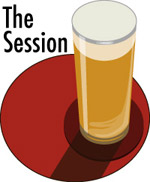 Closing on seven years ago I posted a list of 10 really good beer books. As opposed to, say, the Ten Best Beer Books EVER! Of course, many readers missed the disclaimers (why there were no beer and food books and no technical/brewing/homebrewing books), so I know what I may be getting into by bringing it up and adding two books to that list for The Session No. 115 (“The role of beer books”).
Closing on seven years ago I posted a list of 10 really good beer books. As opposed to, say, the Ten Best Beer Books EVER! Of course, many readers missed the disclaimers (why there were no beer and food books and no technical/brewing/homebrewing books), so I know what I may be getting into by bringing it up and adding two books to that list for The Session No. 115 (“The role of beer books”).
The newcomers are The Beer Bible, by Jeff Alworth, and Triplebock: Three Beer Stories by Evan Rail. The latter is intential fiction (as opposed to the unintential beer fiction that far too often finds its way into print). There is some fiction in The Bedside Book of Beer on my original list, but more quality beer fiction sure would be nice. Yes, the former is a resource, a book you can pull off the shelf to find an answer that settles a bar bet. But it is also a book to read from start to finish, to be considered as a whole, because that’s the way Alworth presents the beers within it.
For those who don’t want the short version, here is the original list:
– The Beer Companion.
– Three Sheets to the Wind.
– Ambitious Brew: The Story of American Beer.
– Beer: The Story of the Pint.
– Travels with Barley: A Journey Through the Beer Culture in America.
– Tasting Beer: An Insider’s Guide to the World’s Greatest Drink.
– Origin and History of Beer and Brewing.
– The Book of Beer Knowledge.
– The Bedside Book of Beer.
– Faces Along the Bar: Lore and Order in the Workingman’s Saloon, 1870-1920.
Or you can read more.
The glaring fault of your list is that it doesn’t include any Stan Hieronymus books. I know why you didn’t include any, but any definitive list must include some of your work. If someone put a gun to your heard and demanded you submit one of your own titles (including the new one), which would you choose?
Thanks for the kind words, Jeff. But, honestly, my books all fit in the “how to” category I excluded. To sort of answer your question, “Brewing Local” was the most fun to write and the first chapter gave me a chance to organize my thought about “place” in print.
Fair enough. I will say that books like Monk and Wheat have a description of beer style that extends from history through technique and provide the reader a deep understanding she’s going to find few other places. If you were studying for the Cicerone test, for example, you would learn a lot.